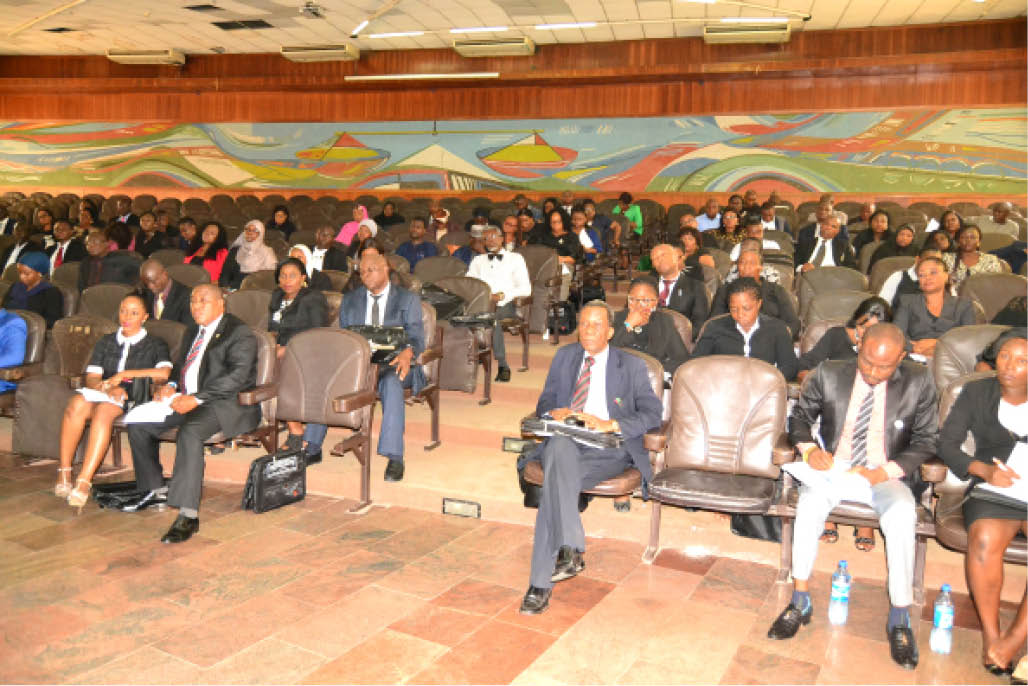After ACJA, experts push for more funding in prosecutions
Nigerian criminal prosecutors rose from a two-day conference in Abuja last week with a call for the adoption of the Administration of Criminal Justice Act (ACJA) across the 36 states of the Federation, and more funding for the justice sector. With the proscription of lay prosecutors by the ACJA under sections 104 and 106, only […]

Cross section of participants at the prosecutors forum in Abuja recently
Nigerian criminal prosecutors rose from a two-day conference in Abuja last week with a call for the adoption of the Administration of Criminal Justice Act (ACJA) across the 36 states of the Federation, and more funding for the justice sector.
With the proscription of lay prosecutors by the ACJA under sections 104 and 106, only lawyers serving with various government prosecuting agencies can prosecute criminal charges against suspected offenders.
Thus, the National Association of Prosecutors, which has become a strong vehicle for strengthening of criminal prosecutions in Nigeria, agreed that adoption of the law across aboard and provision of more funding will enhance the Nigerian justice system.
The decisions were reached at the 5th National Summit on Effective Prosecution of Criminals in Nigeria, which held at the Ministry of Justice in Abuja, organised by the Legal Defence and Assistance Project (LEDAP).
Apart from funding, prosecutors also want the Federal Government and states to revisit the autonomy for the office of the Department of Public Prosecutions (DPP) from the office of the Attorney General of the Federation (AGF) and Ministry of Justice.
The Executive Director of LEDAP, Chino Obiagwu (SAN) said the reform will take criminal prosecutions to the 1963 Constitution, where the office of the “DPP was removed from the Ministry of Justice and can initiate and prosecute cases”.
Speaking at the opening of the conference, the AGF, Abubakar Malami (SAN), called on the remaining 16 states out of 36 and the FCT to urgently adopt the ACJA to create room for uniform best practices and in the states.
The AGF, who was represented by an official of the ministry, Yusuf Abdullahi, said that will help collectively address policy or administrative challenges which could arise from the Act.
In his presentation, Prof Yemi Akinseye-George (SAN) went down memory lane on the improvements brought to the criminal justice system by the provisions on the ACJA.
Akinseye-George listed some of the practices that existed among lawyers before the coming of the Act to include: filing of preliminary objections, interlocutory appeal after ruling, application for grant of stay of proceedings and other delay tactics.
“The Act applies all criminal trials for offences punishable in the Federal Capital Territory and other offences established or created by an Act of the National Assembly. There is no territorial limit to the applicability of the ACJA. It applies all over the country where offences created by Acts of the National Assembly are enforceable by both federal courts and state courts,” he said.
“The ACJA also applies uniformly across the entire length and breadth of the country where law enforcement agencies established by the Constitution or Acts of the National Assembly are competent to operate.”
Prof Akinseye-George, who played a major role in the formulation of the Act, however said to achieve the objective of the Act, the Federal Government should provide better working tools for judges and prosecutors. He also advocated increase in salaries and allowances for judges.
In his speech, human rights lawyer Femi Falana (SAN) said the country should adopt the practice in other countries where lawyers who take cases to court without strong case are penalised.
“In many jurisdictions around the world, lawyers and litigants are penalised where it is evident that the time of the court and the resources of the state have been wasted through the filing of frivolous applications that are deliberately meant to delay trial,” he said.
To address prolonged trials, President of the Pan African Lawyers Union, Chief Emeka Obegolu, called for the use of more plea bargain as envisaged under the ACJA beyond the conventional practice of financial crimes with politically exposed persons but to also defendants in violent crimes such as terrorism, rape and armed robbery.
Presenting a paper titled ‘The Instrumentality of Plea Bargain in Enhancing Speedy Dispensation of Justice,’ he asked prosecutors to note the provision in Section 1 of the Act as follows: “The purpose of this Act is to ensure that the system of administration of criminal Justice in Nigeria promotes efficient management of criminal justice institutions, speedy dispensation of justice, protection of the society from crime, and protection of rights and interests of the suspect, the defendant and the victim” and give true meaning to the purpose of the Act.”
